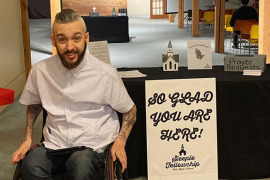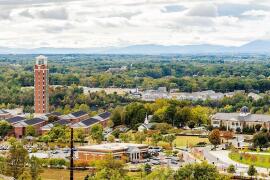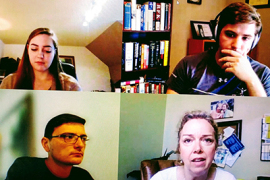Charting the Course — How Liberty University Develops Degree Programs to Meet Future Workforce Demands
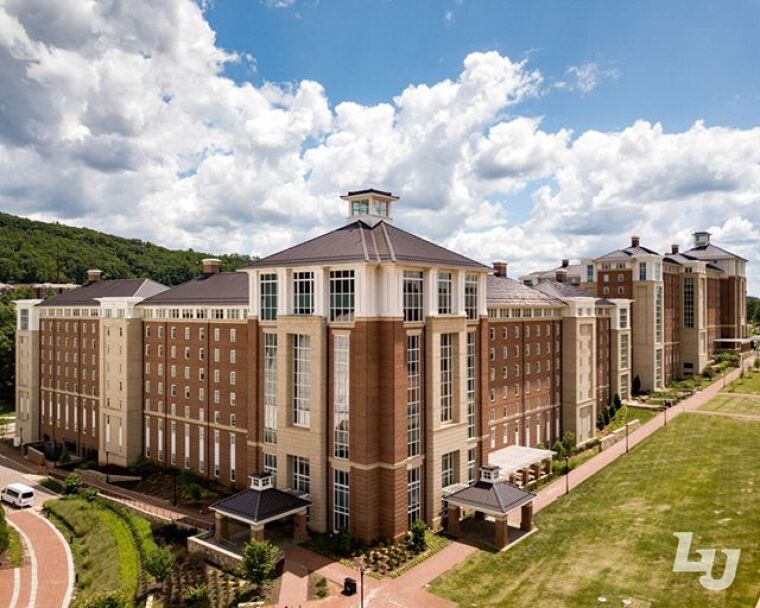
This year, Liberty University celebrated its 47th year of Training Champions for Christ. Few institutions of Liberty’s size have reached this mark with such a large and diverse set of academic programs to their names.
The increase in degrees and specializations since Liberty’s early years as a Bible college is staggering. In the last 10 years alone, the number of residential programs of study has increased by more than 115 percent. Online programs have risen more than threefold, with over 280 currently available to students all over the world.
Liberty certainly stands out as one of the fastest-growing universities to ever settle in the land of higher education, and its reputation for academic excellence continues to raise its national profile. But this hasn’t occurred without a carefully orchestrated plan and dedicated navigators who constantly study the sea of opportunities for students.
As the tide of debate rolls in on whether a college degree today is applicable to the workplace, Liberty is the proven model in developing relevant academic programs that match market demand and lead to student success after graduation.
Setting Sail
A common question posed by prospective students and their parents is how their chosen major could translate into a job.
Some colleges launch programs without any gauge of outcome after graduation, adding them simply because a professor has a particular area of interest they’d like to devote their time to, or even because the college feels a need to keep up with other institutions offering similar degrees. But Liberty has been intentional about designing new programs — and improving existing ones — that prepare students for jobs that meet real needs in society.
At Liberty, the path that an academic program must take from the proposal stage to a degree is stringent. The process is methodical. Ideas for new programs are generated by multiple sources within the university — from academic departments to the provost’s office, enrollment, the registrar’s office, and administration. Then a team from the University Research and Analysis Office starts exploring the higher education marketplace and student demand for the program, as well as labor data, and develops a competitive profile for the proposed program.
According to Brian Soistmann, vice president of University Research and Analysis, the process includes a deep dive into current job postings from across the country to identify the most sought-after knowledge, skills, technological competencies, and credentials that employers are looking for in an applicant.
“It’s a collective process. Our team does a lot of the initial research, then we engage other university offices, such as the Career Center and Enrollment Management, to ensure that the research is consistent with their experience with employers and students,” he said. “We want to build a product in the way that our students’ future employers want it delivered. The goal is to align the program’s curriculum and outcomes with employers’ needs to meet the demands of the market.”
One recent example is the university’s cybersecurity programs in the new Center for Cyber Excellence. Data from the Bureau of Labor Statistics shows that employment trends are rising steeply in the field; about 300,000 cybersecurity-related jobs were posted last year nationwide. Soistmann’s team looked at the cybersecurity degrees being conferred by all colleges in 2016 — about 66,000 (a 44 percent increase from 2012) — then helped the School of Business to strengthen its six cybersecurity programs. Liberty offers three undergraduate cyber programs both residentially and online, as well as three master’s-level online programs. (Learn more at Liberty.edu/Cyber).
>>>Request for Liberty University Online degree info now.
The team broke down the premium skills and certifications listed in job postings in the last 12 months (ranging from specific software skills to security clearance) and set to work building curriculum that would round out the résumés of future graduates.
Liberty has developed or improved several programs where scores of alumni are already making an impact in high-demand fields, including nursing, health care, digital media, and aeronautics (where the industry is expecting a pilot shortage over the next 20 years).
A concentrated effort has been made to add several online master’s and doctoral programs to help professionals advance their careers. Two new Ph.D. programs in public policy and criminal justice are coming this fall. Since last fall, nearly 50 new online degrees, certifications, and specializations have launched across a number of disciplines.
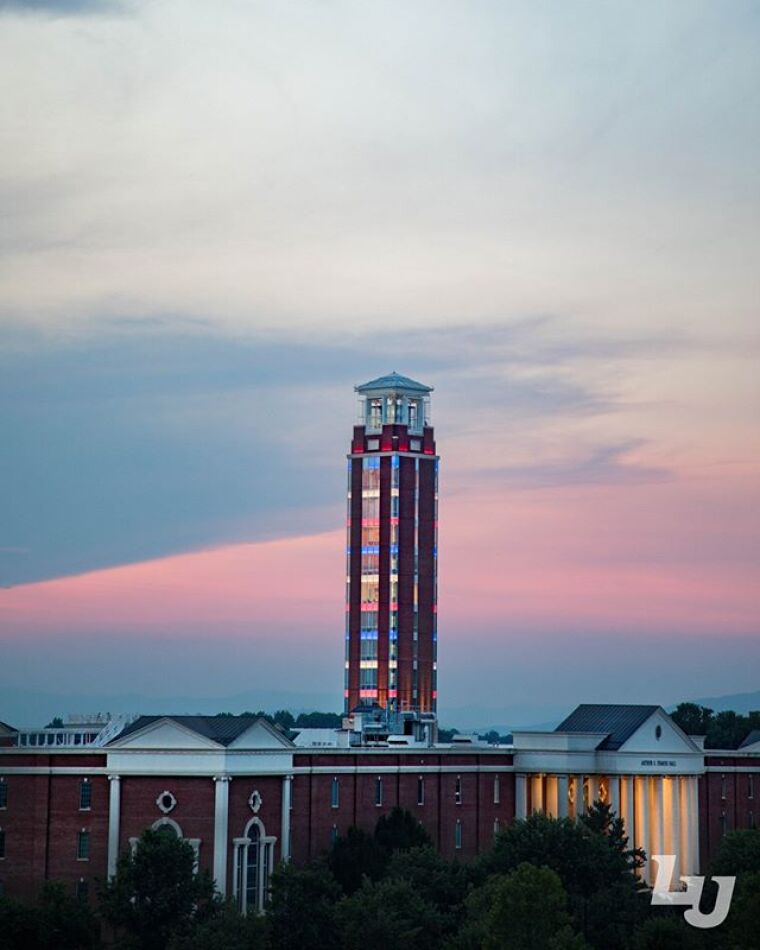
Coming on Board
The attention to workforce development is not done in a vacuum. When developing new programs, Liberty’s dedication to student success often means consulting with leaders in particular industries, bringing in guest speakers who are leading experts and building partnerships with like-minded organizations.
Involving employers in the process well before graduates even knock on their door gives them a chance to not only share their real-world experience with students but also take an active part in building the skill sets of their future employees.
The Center for Cyber Excellence, for example, operates with a board of advisors that includes representatives from local and national companies that employ cybersecurity professionals.
The School of Aeronautics has developed a unique partnership with a leading unmanned aircraft (drone) company, Textron Systems, which has worked on several government projects. Students can earn the same operator certification that the company requires of its employees and can apply for a job before they graduate.
>>>Request for Liberty University Online degree info now.
In the School of Business, students are benefiting from a partnership with Hendrick Automotive Group, the nation’s largest privately held automotive retail organization, with more than 100 car dealerships. With the company’s help, Liberty began offering the Automotive Dealership Management program last spring. Liberty worked directly with the Hendrick Group to develop curriculum, which includes practicums at Hendrick dealerships.
There are many more examples. In the Helms School of Government, local, state, and national law enforcement personnel have helped criminal justice students with exercises held on campus. Partnerships with information technology giants such as Adobe, Microsoft, IBM, and Amazon are bringing students from many different disciplines in direct contact with industry professionals.
Most universities view students as their consumers. But Liberty goes beyond that and defines the consumer as any business or organization who could benefit from hiring a Liberty graduate.
“We look at how we can meet the company’s needs, wants, and desires — not only where they are today but also where they will be five or 10 years from now,” said Dr. Scott Hicks, interim provost. “We need students to enter the marketplace at a fast walk instead of a slow crawl, and then the company will take them to a fast jog. When the employers help us define the skills they need, then we align them with the curriculum and have a more accomplished student going to market.”

Adventure Awaits
Seeing the smiles under those graduation caps is rewarding. But it doesn’t stop there. Graduation is just one stage of the student-employer satisfaction cycle.
“We aim to deliver the most value we can for each student where they are, anywhere in the world, and it’s a lifetime commitment we have with them — a legacy experience,” Hicks said.
The cycle starts when academic programs are developed. Students gain proper training and experience, which leads to career readiness upon graduation. Then, as alumni, they succeed on the job, and employers benefit, contributing to the university’s high rankings and reputation. That influences prospective students, who meet with Liberty’s recruitment and enrollment team and are guided to the academic programs.
Liberty’s Career Center plays an important role in the cycle. With the relevant data in hand, staff can tailor career fairs, resources, internships, and other practical career exploration opportunities to students in particular degree programs. They can also help the university strengthen partnerships with employers who are already engaged in the process.
“The Career Center aims to provide students with the skill sets to succeed in their jobs by offering a wide spectrum of career preparation and guidance, as well as job and internship offerings,” said Sarah Falwell, executive director of Career Partnerships & Career Services. “These skill sets are handcrafted by our staff members who are dedicated to student success.”
>>>Request for Liberty University Online degree info now.
The process includes one-on-one résumé and cover letter critiquing, mock interviews, and professional development meetings.
This summer, the Career Center is launching its first New York City Fellowship, where students will gain priceless opportunities in professional and personal development through internships with some of the largest companies in the world. The center has already had success with its Washington Fellowship, a semester-long program that places students from different disciplines into internships in the nation’s capital. (Learn more at Liberty.edu/Career).
Students are grateful for these opportunities. Recent biomedical sciences graduate Rachael Glavin interned at the National Institutes of Health last fall, where she contributed to research in skin cancer treatment.
“It was so amazing and such fulfilling work,” Glavin said. “Now, I can look back and say, ‘These are all the things that I have done — I did this. I accomplished this.’ And it’s so cool knowing that what I did could really help someone.”
Amazing. Fulfilling. Accomplished. Those are words that show Liberty’s mission is central to the academic experience. With every new program, Liberty remains committed to training tomorrow’s leaders, whose impact will extend beyond their professions to change the world around them.
With more than 550 unique programs of study from the certificate to the doctoral level, including over 280 offered online, Liberty University is Training Champions for Christ to impact every corner of society. In addition to the university’s regional accreditation by the Southern Association of Colleges and Schools Commission on Colleges, many programs are accredited or otherwise recognized by specialized professional and accrediting agencies.
>>>Request for Liberty University Online degree info now.

